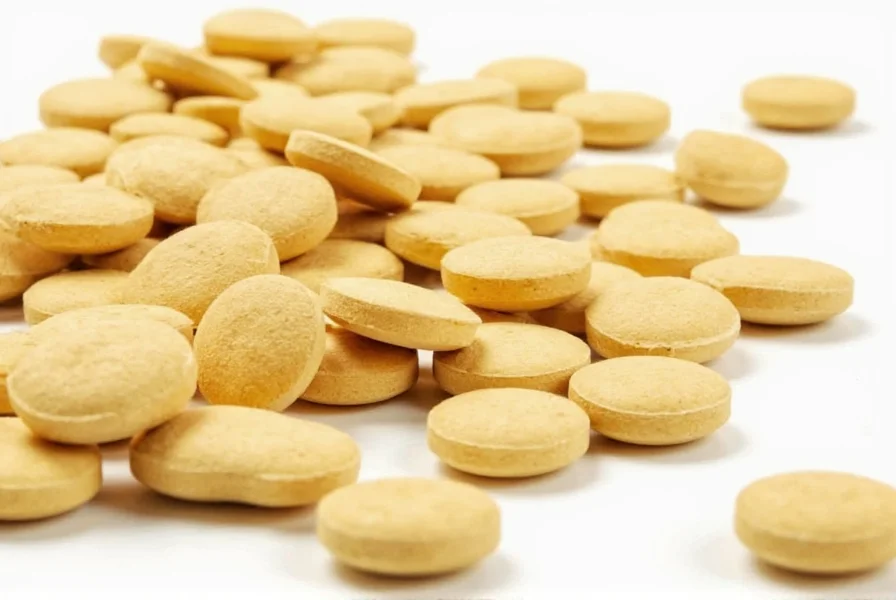Ginger tablets offer a convenient, standardized way to access the medicinal properties of ginger without the taste or preparation of fresh root. As one of the most researched herbal supplements globally, ginger has demonstrated significant therapeutic potential for various health concerns. This evidence-based guide examines what scientific research reveals about ginger tablets' effectiveness, proper usage, and safety considerations.
What Exactly Are Ginger Tablets?
Ginger tablets contain processed ginger root in compressed form, typically as a dried extract standardized to specific concentrations of active compounds. Unlike fresh ginger, which varies in potency, quality ginger tablets provide consistent dosing of gingerols and shogaols—the primary bioactive components responsible for ginger's therapeutic effects.
Most clinical studies on ginger tablets for nausea relief use standardized extracts containing 5% or higher gingerol content. The concentration matters significantly, as lower-quality products may contain insufficient active compounds to produce measurable effects. When evaluating how much ginger tablets should I take, consider that standardization ensures you're receiving a consistent amount of the compounds that deliver benefits.

Science-Backed Benefits of Ginger Tablets
Research supports several specific applications where ginger tablets demonstrate measurable benefits:
Nausea and Motion Sickness Relief
Multiple clinical trials confirm ginger tablets' effectiveness for various forms of nausea. A comprehensive review in Advances in Therapy found that doses of 1-1.5g daily significantly reduced pregnancy-related nausea. For motion sickness, studies show taking 1g of ginger tablets 30-60 minutes before travel provides comparable relief to conventional medications without drowsiness.
Digestive Health Support
Ginger stimulates gastric motility and digestive enzyme production. Research published in European Review for Medical and Pharmacological Sciences demonstrated that 1.2g daily of ginger extract accelerated stomach emptying by 25% in participants with functional dyspepsia. This makes ginger tablets for digestion particularly valuable for those experiencing occasional indigestion.
Inflammation Reduction
The anti-inflammatory properties of ginger come primarily from 6-gingerol. A study in Journal of Medicinal Food showed that 2g daily of ginger extract reduced inflammatory markers by 28% in osteoarthritis patients after six weeks. While not a replacement for prescription anti-inflammatories, ginger supplement dosage for inflammation typically ranges from 1-2g daily for chronic conditions.
| Condition | Effective Dosage | Time to Effect | Research Support Level |
|---|---|---|---|
| Morning sickness | 250mg 4x daily | 1-2 weeks | High (multiple RCTs) |
| Post-operative nausea | 1g pre-surgery | Immediate | Moderate |
| Osteoarthritis pain | 500mg 2x daily | 4-6 weeks | Moderate |
| Digestive support | 1.2g daily | 30-60 minutes | Emerging |
Proper Dosage Guidelines
Determining how much ginger tablets should I take depends on your specific health goal:
- Nausea relief: 250-500mg taken 3-4 times daily, or 1g taken 30-60 minutes before potential nausea triggers
- Digestive support: 500-1000mg taken 30 minutes before meals
- Inflammation management: 1-2g daily divided into 2 doses
Most clinical trials showing benefits use doses between 1-2g daily, rarely exceeding 4g. The European Medicines Agency considers daily intakes up to 4g safe for adults, though higher doses increase the risk of side effects. For ginger tablets for motion sickness, timing matters as much as dosage—taking them before exposure yields better results than after symptoms begin.
Safety Considerations and Side Effects
Ginger tablets are generally well-tolerated, but potential side effects include:
- Mild heartburn or stomach upset (especially at higher doses)
- Increased risk of bleeding when combined with blood thinners
- Potential blood sugar lowering effects (caution for diabetics)
- Rare cases of mouth or throat irritation
Certain populations should exercise caution with ginger tablets:
- Pregnant women: Generally safe up to 1g daily, but consult your healthcare provider
- Surgery patients: Discontinue at least 2 weeks before procedures due to bleeding risk
- Diabetics: Monitor blood sugar as ginger may enhance medication effects
- Gallstone sufferers: May increase bile production, potentially causing discomfort
Most cases of ginger tablets side effects occur with excessive consumption beyond 4g daily. If you experience persistent discomfort, discontinue use and consult a healthcare professional.

Choosing Quality Ginger Tablets
Not all ginger supplements deliver equal benefits. When selecting products, look for:
- Standardized extracts specifying gingerol content (minimum 5%)
- Third-party testing seals from USP, NSF, or ConsumerLab
- Clear dosage information matching research-backed amounts
- Minimal additional ingredients (avoid unnecessary fillers)
Be wary of products making exaggerated claims like "cures arthritis" or "eliminates nausea instantly." Reputable manufacturers of effective ginger tablets for digestion will reference scientific studies without overpromising results. The difference between ginger extract vs fresh ginger lies in consistency—tablets provide reliable dosing that fresh ginger cannot match due to natural potency variations.
Ginger Tablets vs. Other Ginger Forms
While fresh ginger offers culinary versatility, tablets provide distinct advantages for therapeutic use:
- Dosage precision: Tablets deliver exact amounts of active compounds
- Convenience: No preparation required, portable for travel
- Stability: Properly stored tablets maintain potency longer than fresh root
- Taste: Avoids the strong flavor that some find unpleasant
For those wondering are ginger tablets effective for motion sickness, research suggests they work better in tablet form than as tea or fresh ginger because the standardized dose ensures sufficient active compounds reach your system before travel begins.
Frequently Asked Questions
How long does it take for ginger tablets to work for nausea?
For acute nausea like motion sickness, ginger tablets typically begin working within 30-60 minutes when taken preventatively. For pregnancy-related nausea, consistent daily use for 1-2 weeks shows the most significant improvement according to clinical studies. The effectiveness depends on taking an adequate dose (at least 250mg) of a standardized extract.
Can I take ginger tablets every day?
Yes, ginger tablets can be taken daily within recommended dosage limits. Most studies showing benefits use daily doses of 1-2g for periods of 4-12 weeks. The European Medicines Agency considers up to 4g daily safe for adults, though doses above 1g may cause mild digestive side effects in some people. For long-term daily use beyond 3 months, consult with a healthcare provider.
What's the difference between ginger tablets and ginger capsules?
The primary difference is in formulation rather than effectiveness. Tablets are compressed powders that may dissolve more slowly, while capsules contain powdered or liquid extract that typically absorbs faster. Both forms can deliver effective doses when properly standardized. Some people prefer capsules for easier swallowing, while others choose tablets for potentially slower release. Research shows comparable effectiveness between properly dosed tablets and capsules for ginger tablets for nausea relief.
Do ginger tablets interact with medications?
Yes, ginger tablets may interact with certain medications. They can enhance the effects of blood thinners like warfarin, potentially increasing bleeding risk. Ginger may also lower blood sugar, which could amplify diabetes medications. Additionally, ginger might increase stomach acid production, potentially affecting medications for acid reflux. If you take prescription medications, especially blood thinners or diabetes drugs, consult your healthcare provider before starting ginger tablets.
Are ginger tablets safe during pregnancy?
Research suggests ginger tablets are generally safe during pregnancy for managing morning sickness at doses up to 1g daily. A systematic review in Obstetrics & Gynecology found no increased risk of miscarriage or birth defects at these doses. However, pregnant women should consult their healthcare provider before starting any supplement. Most healthcare providers consider ginger tablets safer than many pharmaceutical options for pregnancy-related nausea, but individual circumstances may vary.











 浙公网安备
33010002000092号
浙公网安备
33010002000092号 浙B2-20120091-4
浙B2-20120091-4